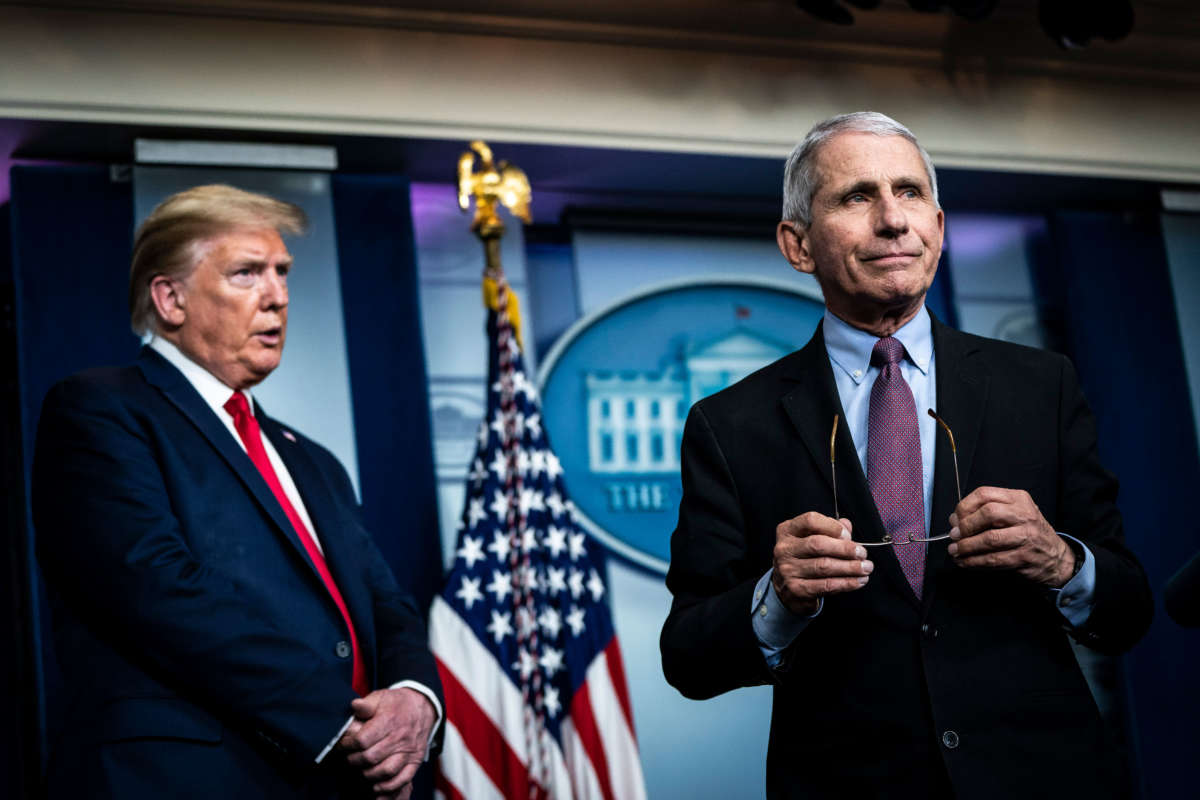President Donald Trump expressed confusion and disappointment on Tuesday in response to the news that some members of his coronavirus task force are getting higher approval ratings than he is for their responses to the pandemic.
Trump’s gripe focused mainly on Anthony Fauci, director of the National Institute of Allergy and Infectious Diseases.
“He’s got this high approval rating. So why don’t I have a high approval rating with respect — and the administration — with respect to the virus?” the president asked. “We should have it very high.”
“It can only be my personality, that’s all,” he concluded.
Trump said he held no ill feelings toward Fauci but nevertheless spent significant time during a press briefing at the White House on Tuesday pondering why Fauci is getting better marks from the American public than he is.
Trump’s musings on his approval ratings are inconsistent with what he usually says about polls. Typically, the president dismisses as “fake” any polling numbers that show “bad” approval ratings for him; conversely, he highlights surveys that provide the occasional “good” ratings for him. Trump has also sometimes fabricated good polling numbers from nonexistent polls.
His acknowledgment of his negative polling numbers aside, Trump’s statements about Fauci on Tuesday were misleading in a number of ways.
In talking about Fauci, the president claimed, “I get along with him very well and I agree with a lot of what he’s said,” but in truth, it was just earlier this month that the White House had attempted to smear Fauci’s name, due likely to the doctor frequently disagreeing with Trump’s attitudes and beliefs about coronavirus.
Only after that plan backfired did Trump have a phone conversation with Fauci, the first time in months the two had spoken with one another in a direct way.
Polling data does indeed demonstrate that Fauci is more respected on COVID-19 than the president. The most recent Economist/YouGov poll found that 52 percent of Americans trust “a lot” or “somewhat” the medical advice from Fauci, while Trump only received 34 percent on the same question.
There could be a number of reasons for this. For starters, Fauci’s advice typically matches what the vast majority of medical experts are saying about coronavirus, while Trump’s words tend to go in the opposite direction.
For instance, while Trump continues to peddle hydroxychloroquine as a way to treat COVID-19, Fauci has been more tepid on the matter, siding with studies that have demonstrated the drug is not effective in treatment of the disease.
“The scientific data is really quite evident now about the lack of efficacy for it,” he said in May.
Fauci also pushed for more states to issue stay-at-home orders in April, when Trump at the time was insisting states should reopen sooner than most experts were saying was feasible. While Fauci stopped short of calling for a national order, he was befuddled by the fact that more states weren’t taking steps themselves to address the spread of coronavirus.
“The tension between federally-mandated versus states rights to do what they want is something I don’t want to get into, but if you look at what’s going on in this country I just don’t understand why we’re not” seeing more states issue stay-at-home orders, he said in April.
Such opinions were shared by the American public. One poll at the time even found that 87 percent of Americans supported stay-at-home orders or even wanted stricter orders mandated.
Those sentiments remain. In a poll that was released just last week, 75 percent of Americans said they still support such orders.
Join us in defending the truth before it’s too late
The future of independent journalism is uncertain, and the consequences of losing it are too grave to ignore. To ensure Truthout remains safe, strong, and free, we need to raise $31,000 in the next 48 hours. Every dollar raised goes directly toward the costs of producing news you can trust.
Please give what you can — because by supporting us with a tax-deductible donation, you’re not just preserving a source of news, you’re helping to safeguard what’s left of our democracy.
